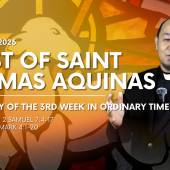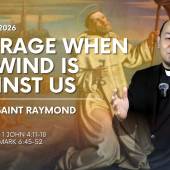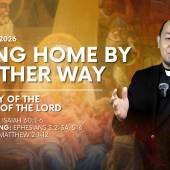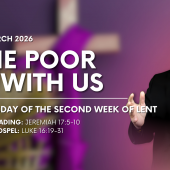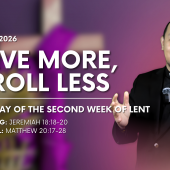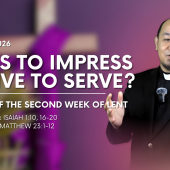The one who chooses God makes a choice to salvation!
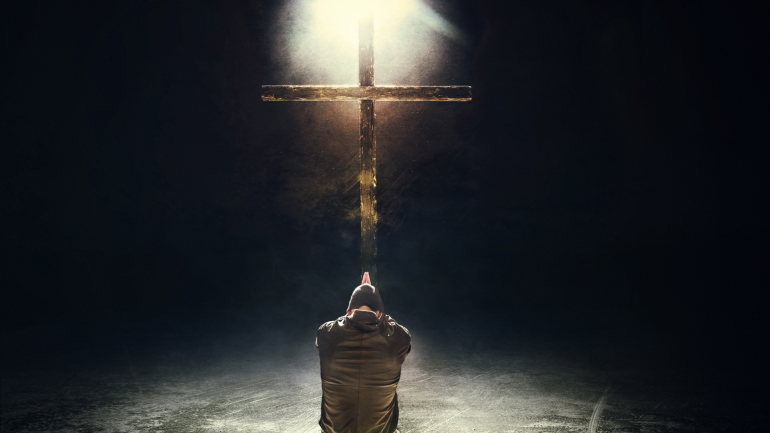
November 16, 2025 Thirty-third Sunday in Ordinary Time
Daily Readings: Malachi 4:1-2a; 2 Thessalonians 3:7-12; Luke 21:5-19
The Holy Mother Church celebrates the 9th World Day of the Poor today. This day aims to shed light on the many faces of poverty and enables us to embrace and embody Christ’s charity. The theme of this year is “You are my Hope” (Psalms 71:5). This hope is not just a feeling but a dynamic force that transforms despair into compassion and loneliness into a sense of community. As the end of the liturgical year is drawing near and the Holy Season of Advent is close at hand, the readings of today and in the coming days will focus on the themes of eschatological times and the coming of Jesus Christ, the Saviour of the world.
The First Reading taken from Malachi, the last prophet in the Canon of the Holy Bible draws our attention to the day of the Coming of the Lord. This brief reading is full of many frightful metaphors. What could have prompted the prophet to speak in these vindictive terms? As it is happening even today, the people witnessed the evil flourishing and the wicked enjoying God’s blessings in terms of prosperity. Those who serve God and live an honest life have become the laughing stock. They are being exploited. Therefore, prophet Malachi warns them of what is going to happen on the day of “his coming”. That day will be “burning like an oven”. It means it is going to be a day of God’s wrath. It is a day of punishment and destruction. All the arrogant and all the evildoers will face their end in ashes. They will be destroyed like a tree from the roots to all the branches. It points to complete destruction. But that is not the case with those who revere the name of the Lord. Unto them will arise “the Sun of righteousness”. He brings along healing and long life in his wings. It simply means salvation, liberation, restoration and renewal that is both physical and more importantly spiritual. It is going to be holistic. The prophet calls for the return of the people to God. They have to make up their minds and hearts to stay rooted in the Lord to experience spiritual joy and freedom.
The Responsorial Psalm invites all those who pray this Psalm to sing praises of God for all His wonderful creation. The musicians are also invited to join and accompany the singers. It should be a joyful song. It is because as we read in verse 9, God comes to rule the earth, the world and the peoples. The author of the psalm is creative and overwhelmingly optimistic.
The Second Reading is taken from the Second Letter of St. Paul to the Thessalonians. Often St. Paul presents himself as a model for the Christians. He imitates Christ and he expects that Christian followers must learn to imitate him (cf. 1 Corinthians 4:16 and 11:1). It is in this context that Paul exhorts the Christians in Thessalonica to imitate him but with a twist or rather one of the dimensions. Paul was a hard working person. He laboured day and night. He was a skilful tanner and tentmaker. This job was strongly despised by his contemporaries but it gave him enough sources to manage his expenses and also avoid being a burden to anyone. Self-reliance enabled him to preach without fear and hesitation. No one could control or dictate the content of his preaching. Thus he voluntarily foregoes his right to remuneration for his preaching. That grants him an occasion to exhort the Corinthians not to remain idle but the Greek word that is translated as idle can also be translated as “disorderly”. We know that Paul is obsessed with order in every community he is in touch with. Disorder is a major threat to communal well-being.
Paul confesses that he heard of a cluster of believers who live in idleness, mere busy bodies and not doing any work at all. “Busy bodies” point to a person who hesitates to take or own any responsibility but interferes in everybody’s work and thus disturbs the order in the community. As a responsible leader of the community, Paul warns and exhorts such people “in the Lord Jesus Christ to do their work quietly and to earn their own living” (2 Thessalonians 3:12).
In the Gospel Reading from St. Luke, Jesus predicts what is going to happen to the temple of Jerusalem and his contemporary world. The temple in question is not the one that was built by King Solomon at some time between 971-931 BCE. It was destroyed by Babylonian pagan king Nebuchadnezzar in 587 BCE. The temple that Jesus speaks about is the one which was built by Ezra and Nehemiah in 536 BCE when the exiles returned to Jerusalem. Herod the Great spent lots of money and time to embellish this temple during his rule (circa 37-4 BCE) even though it was only to be in the good books of the Jews for his selfish reasons. St. Luke tells us what Jesus foretold about the destruction of this temple. Interestingly when Luke wrote this Gospel sometime in 80-85 AD, Jesus had already died. In fact, destruction was over by 70 AD. But this text tells us that Jesus was aware of the fate of this temple because he was a “prophet mighty in word and deed” (Luke 24:19).
The first instruction that Jesus gives to his disciples is not to be deceived by false teachers. “Beware of them” is the warning of Jesus. Wars and insurrections will be accompanied by many natural disasters such as earthquakes, famines and plagues. Frequent persecutions and imprisonments from ad extra together with betrayals from ad intra will be the norm of this time. Therefore perseverance will be the key because God’s ever-abiding presence and protection are guaranteed. The believers should have the courageous presence of mind to turn and transform this moment into a time of bearing witness to God’s love. They have to learn to save their souls. Salvation of humanity is after all the solitary intent of the creator.
Call to Action: Reliance in God, courage and confidence in the face of persecution and perseverance are hallmarks of true Christians!
Radio Veritas Asia (RVA), a media platform of the Catholic Church, aims to share Christ. RVA started in 1969 as a continental Catholic radio station to serve Asian countries in their respective local language, thus earning the tag “the Voice of Asian Christianity.” Responding to the emerging context, RVA embraced media platforms to connect with the global Asian audience via its 21 language websites and various social media platforms.









